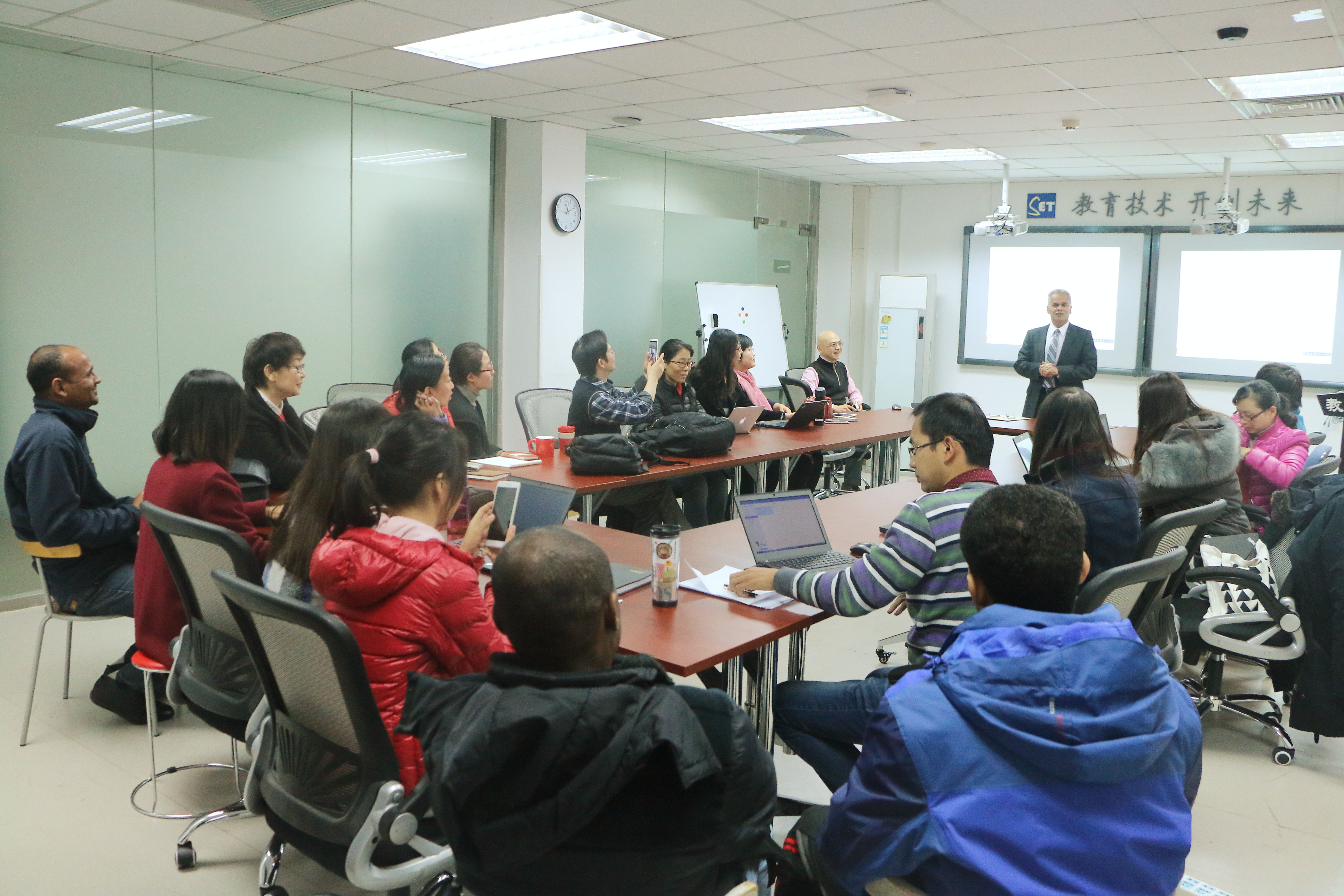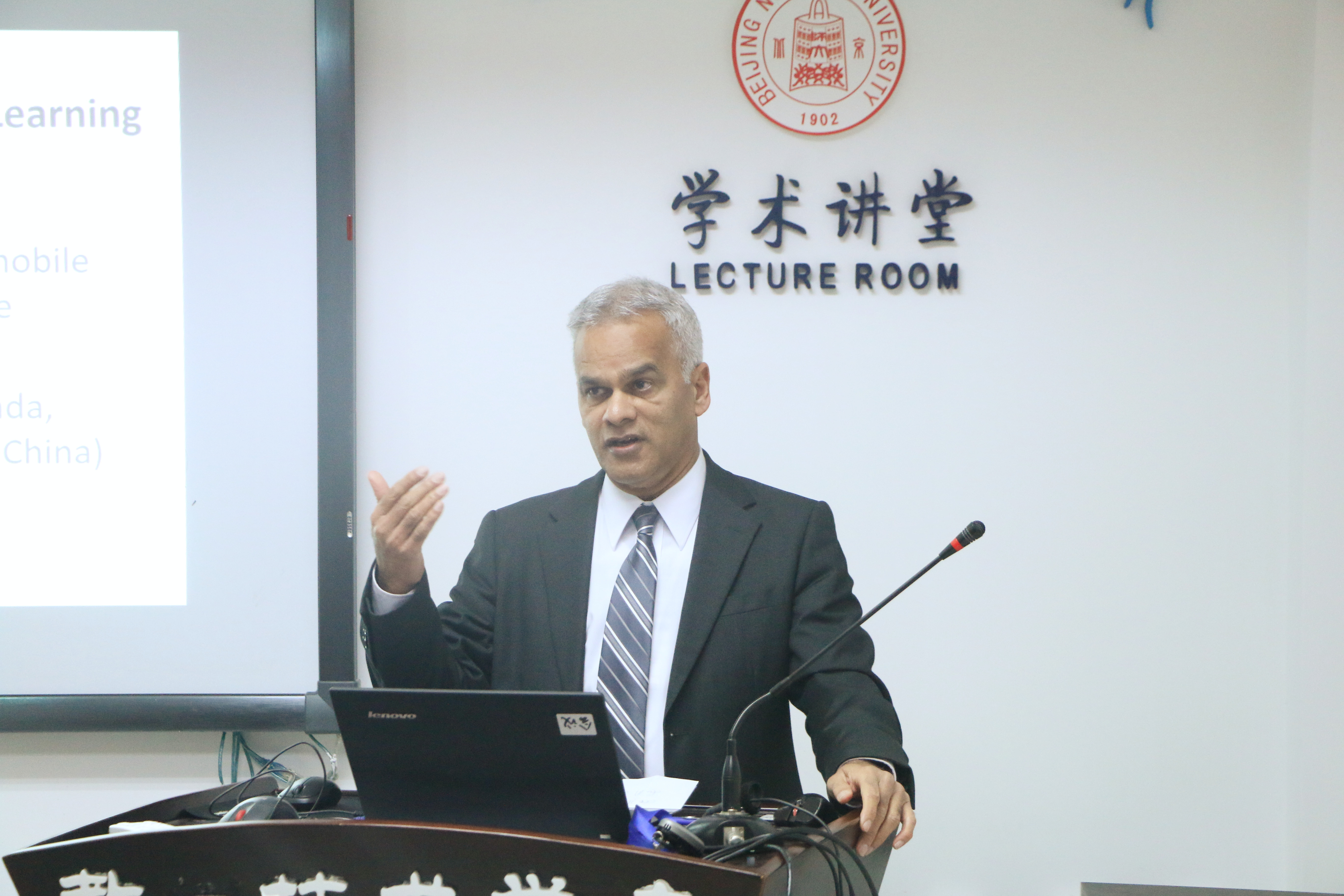Emerging Technologies and Innovative Pedagogies: Professor Mohamed Ally Delivered a Lecture
Professor Mohamed Ally from Centre for Distance Education and Researcher in the Technology Enhanced Knowledge Research Institute (TEKRI) at Athabasca University, Canada delivered a lecture titled Emerging Technologies and Innovative Pedagogies: Impact on the Future Education from 2:00 to 3:30 pm on November 10, 2016 in the Room 208, School of Educational Technology, Beijing Normal University (BNU). Professor Ally is also a committee member in Advisory Board at Beijing Advanced Innovation Center for Future Education (AICFE). This lecture was organized by AICFE and was intended to provide a comprehensive overview of new technologies and pedagogies. The lecture attracted more around 30 audience, including graduate students, international students, researchers and professors at BNU. Professor Ally was very considerate for audience. Since most of them are English language learners, he put lots of content on PowerPoint as a facilitation and he emphasized books that have Chinese version.
As countries around the world educate their citizens so that they can become more advanced in the 21st century, they must use emerging technologies and innovative pedagogies to reach and educate as many citizens as possible and to promote lifelong learning. The young generations of students are comfortable using emerging technologies and they will require that education be delivered using emerging technologies. Hence, there is a sense of urgency to transform education using emerging technologies and innovative pedagogies to deliver education. Education must make the shift from paper-based learning materials to electronic materials for delivery on a variety of technologies including notebooks, tablets, and smart phones. This is critical since there are many learning materials already available in electronic format. Perhaps, eventually all learning materials will be available in electronic format so the education system at all levels must make the shift to E-learning, online learning, and mobile learning. Some of the electronic learning materials are available as Open Education Resources (OERs) which can be use at no cost for education purpose. However, the electronic learning materials must be interactive to promote high level learning to encourage creativity. Interactivity for high level learning can be achieved using augmented reality, virtual reality, and mixed reality. A variety of learning strategies can be used including Problem-Based Learning (PBL) where students learn the information and develop high levels skills as they solve the problems. In addition, a variety of delivery formats can be used. The blended learning approach which combines face-to-face instruction and online learning can be used to provide flexibility in learning. In the online learning mode, students can access learning materials at their own time for individualized work or they can interact with other students and the teacher using synchronous and asynchronous communication technologies. In synchronous communication, students can have live discussions with the other students and the professor while with asynchronous communication, such as forums, students can reflect individually before they communicate with other students and the professor. The flipped classroom can also be used where students learn the theory outside the classroom using learning technologies to access the information and then develop the high level and affective skills in the classroom or lab where the teacher is available to provide guidance. Students can also access Massive Open Online Courses (MOOCs) at their own convenient time to further develop their knowledge and skills. Students will learn in the cloud. This presentation will describe how education can be transformed using emerging learning technologies and innovative pedagogies and look into the future.

Picture 1: Professor Mohamed Ally and audience

Picture 2: Professor Mohamed Ally
Further Reading:
1. Professor Mohamed Ally
Dr. Ally is Professor in the Centre for Distance Education and Researcher in the Technology Enhanced Knowledge Research Institute (TEKRI) at Athabasca University. He was the Director of the Centre of Distance Education and the School of Computing and Information Systems at Athabasca University, Canada. He obtained his Ph.D. from University of Alberta, Canada. His current areas of research include distance education, mobile learning, e-learning, and use of information and communication technology in training and education. Dr. Ally is one of the Founding Directors of the International Association for Blended Learning (IABL) and is currently the Vice-President of IABL. He was President of the International Federation of Training and Development Organizations (IFTDO) and is one of the Founding Directors of the International Association of Mobile Learning (IamLearn). He was also on the board of the Canadian Society for Training and Development. Dr. Ally chaired the Fifth World Conference on Mobile Learning and co-chaired the First International Conference on Mobile Libraries. He recently edited 12 books on the use of mobile technology in education, training and libraries. His book “Mobile Learning: Transforming the Delivery of Education and Training” won the Charles A. Wedemeyer Award in the United States for significant contribution to distance education. Two of his research papers won the best research paper award at national and international conferences. Dr. Ally has published in peer-reviewed journals, chapters in books and encyclopedia and served on many journal boards and conference committees. He has presented keynote speeches, workshops, papers, and seminars in many countries.
2. Athabasca University
Athabasca University (AU) is a Canadian university specializing in online distance education and one of four comprehensive academic and research universities in Albert. Founded in 1970, it was the first Canadian university to specialize in distance education.

